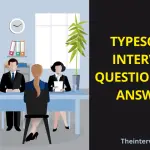Are you one of the applicants who think having an employment gap in your resume can ruin your whole career? Or are you simply petrified of answering this question of having an employment gap?
Well, most of us have gone through such a situation in life, wherein we don’t know what to say about our employment gap, especially if it is a lengthy one! Explaining these gaps can be quite awkward, intimidating, and confusing – all at the same time. The question – Why do you have an employment gap? Can trigger a lot of emotions at one time.
Your employment gap could be because of any reason- maybe you or a family member had a health issue, maybe you wanted to study further, or maybe you were a victim of the recession in your country. But how to answer these tricky questions smartly is what we would be catering to in this article so that you are never in a demanding or challenging spot in front of your hiring manager.
What Is An Employment Gap?
Before learning or knowing how to answer this question, it becomes extremely vital to understand what exactly this term means. Employment Gaps are the periods in your career wherein you did not have a formal job or employment for a specific period of time.
Having an employment gap does not mean you were not earning anything during that time. You could be freelancing or doing your own business, but since you were not employed by anyone or any company for a period of time- hence, it would be termed as an employment gap.
Your decision of having this employment gap could be voluntary but explaining why you had it can be a tedious task for any candidate. ‘Why do you have an employment gap’ is one of the most asked questions after ‘why are you looking for a job change?’.
Reasons For Employment Gap
First and foremost, every candidate who is currently on this blog must understand that having an employment gap is not a sin and should never be treated as one. Now answering your question as to what reasons you could give, we also need to understand that your reasons could be either Personal or Professional.
Personal Reasons for an Employment Gap
Having personal reasons of why you do not want to take up a job for a specific period of time is absolutely normal and a lot of people go through this. Your reasons could be-
Professional Reasons for an Employment Gap
Having professional reasons for an employment gap is much more common than having personal reasons. Here are some professional reasons you could be having:
These were a few personal and professional reasons for the employment gap. However, the employment gap shall be put in front of the hiring managers in the right way. Let us see a few tips to follow before answering this question.
How To Talk About Employment Gaps?
Talking about your employment gap can be overwhelming and intimidating. There could be plenty of reasons why you have that employment gap in your resume. However, when asked about this gap, we often feel a certain pressure that makes us awkward and makes the amazingly going interview not so amazing. Follow these tips and tricks and make talking about employment gaps a relatively easy topic.
Be Honest
Being honest about having these certain gaps is the way to go. The pandemic has not spared most of us, so it’s better you be extremely honest about having an employment gap. Telling the right reasons will help you create trust and a great first impression in front of the hiring manager.
Be Prepared
Answering about having an employment gap will be super easy if you can prepare yourself for it. Prepare yourself – if you have an employment gap, it will come up. All you have to do it, explain why you have this gap, assure them that this gap still doesn’t affect their work ethics, and be prepared to be asked further questions about this gap.
Make up your mind about which job you need to include in your resume
If you want to dodge this question, you can simply omit the job after which you had a long career break. However, this can be done only if you have had a long career, and having a little break in the middle of a continuing job would not show up or matter to most employees.
Mention the years of your job, not months in your resume
If your employment gap was years ago, you could disguise it by mentioning the job in years and not months. For example – I worked at ABC as a sales manager from 2017-2018. This way, your employer would not get to know that you have an employment gap. But this will work when your employment gap has been of over less than a year only.
Add the personal gains and experiences during the employment gap
If you have done a short-term online course or indulged in some hobby during your employment gap, make sure to mention that in your resume or to your hiring manager. This could speak volumes about your dedication.
Don’t overshare
Be brief and concise about your reasons for having the employment gap. Do not go into much detailing and depth until asked. Just mention your reasons and quickly switch to the next topic. Mentioning your employment gap in a tell me about yourself question helps you answer this question briefly without many questions and details.
One needs to ensure that he follows these tips when you are to explain the employment gap in an interview.
How To Explain A Lengthy Employment Gap In An Interview?
While it is easy to hide a short employment gap of fewer than 6 months, but longer ones need a fool-proof explanation as that is something that becomes questionable.
Now, you would be wondering what exactly counts as a lengthy or long employment gap? So, let us be clear and tell you that anything more than 9 months, that is if you have an employment gap of more than 9 months, it is considered to a lengthy one.
The main tip for it would be, to be honest, but not apologetic. Taking time off for any reason is never a bad idea. Whether it was to support someone close, or to take care of your health, or to figure what job you need – never be sorry for having an employment gap like that is something in the past.
Make sure that your employer knows that you are still a dedicated employee and are willing to work for a long time. This will make your employer trust you and the chances of your getting hired will increase. Including things like pursued a short-term online course while you were unwell for a year would count as you being work-driven and highly motivated.
Well, now let us see a few hacks of hiding your employment gap on the face of your resume and not making it evident to the employer.
Hacks to Hide Employment Gap in a Resume
Jobseekers go to extreme lengths when it comes to hiding their Employment Gap. However, we have a few quick hacks for you which will take care of your employment gap by not letting it show in your resume.
Why Shouldn’t You Stress About Having Employment Gaps?
Truth be told, with the ever-changing economy, employment gaps have been extremely normal, and they should not be something you should worry about, especially if they were a long time ago or were short ones. Having employment gaps does not mean you’re lazy or demotivated. There are infinite reasons why people end up having employment gaps. The most important fact is that you are still out there looking for a job, and you are still willing to give it your 100%.
What Should You Not Talk About While Discussing The Employment Gap?
While having employment gaps is super normal, but there are certain boundaries that no one should really cross. Telling your employer about how wrongfully you were fired and getting all heated up about it would not cast a great impression.
Mentioning how you did not feel like working for a long time is not what you would say at an interview. In fact, you would state your reasons and tell your employer how you missed working every minute in your employment gap.
While being unapologetic, don’t forget there is a thin line between being unapologetic and ignorant. Having too many employment gaps could say negative things about you and might not be in your favor. Hence, a candidate should be extremely careful about these few things.
An Extra Tip – Include Details About Your Employment Gap In Your Cover Letter
Give some details about why you have a gap in your career, giving the hiring managers valid points and reasons along with what productive things you did during these gaps could be the way to go for you. However, employers don’t generally go through the cover letter in detail, so always be prepared for such questions during an interview.
Sample Answers to Explain an Employment Gap
If you know that you have an employment gap that will be surely brought up during the interview, you must prepare in advance and gather all the reasons to create a lasting first impression.
Here are a few examples with their answers that can help you fetch that dream job of yours.
Example 1 – Where to explain employment gaps?
Answer – It’s always best to mention these gaps in questions like – tell us about yourself or tell us about your professional life. This way, you can be super honest about it, even if your resume does not mention it. The key reason why you should mention it yourself in the initial questions is that because this way, you can be brief and concise about it. This way, you can give how much information you want to give, without going into much depth.
Example 2 – How to explain a 10-year gap in employment?
Answer- There is no denial that being unemployed for 10 years is a huge time. But, if you have all the right reasons, there is nothing to worry about. Your reasons could be right and valid. There just should be confidence in your tone so that you sound convincing.
Maybe you just had a child and wanted to give your time to them, and later after 10 years, you realize that you are ready to shoot up your professional career once again. Again, there is never a wrong time to start your career once again.
Your reason also could be that you suffered a prolonged sickness that did not allow you to take a job for so long. In such a case, having a valid and logical answer is the key.
Mentioning things like you were not sure as to what job you want to take up, or what industry you want to be a part of that too for 10 years could be something questionable, so one should refrain from that.
Example 3 – Employment gap due to marriage
Answer- If you got married and moved to another city with your partner or had a baby just after marriage can be a logical and valid reason for having an employment gap. Never think that you are going to be judged for having these personal reasons. It is not even worthy of explaining how you wanted to be the primary caregiver of your child and be there with them. Taking a break because of marriage and children is something which is very well-taken by employers and hiring managers.
Example 4 – How to explain gaps in employment due to illness (physical or mental)?
Answer – Being ill is something that is never in your control. This could be physical illness or mental illness. Just make sure, to be honest about it, but assure your employer that you are better now and willing to work for longer periods. Include a report from your doctor or hospital which mentions that you are fit as a fiddle now.
Example 5- Gap in resume due to depression
Answer – Having gaps in your career due to depression is something you should not be apologetic about. Depression is something you can mention, but your employer would not ask any more questions about it. You can surely mention how tough it was to cope up with work because of it, and how you missed working during this tough time, but your hiring manager should not ask any further questions about this, as this is a sensitive topic for the interviewee even if they have battled it.
Example 6- How to explain gaps in employment due to disability?
Answer- No wonder, accidents are rare!! But, they might come with some disabilities in your health. These disabilities might be difficult to recover and may take a long time due to which you might not be able to work.
In such a case, you have to convince your hiring manager that you have been courageous enough to overcome the disability by developing your skills and now you are fit and willing to work and come back to perform on the field.
You may mention that you always kept yourself updated with the business world by reading and staying in touch with your fellow members.
So, these were a few situations wherein you need to explain the employment gap. I hope, we have guided you much in-depth and made you all set to answer this difficult part of your interview.
Conclusion on How to Explain Employment Gap?
Having an employment gap is something you should never be unapologetic about, especially if they were for all the right reasons. There is no denial that a longer employment gap is a little more worrisome as compared to the shorter ones, but that doesn’t mean that it’s the end of the career for you. Beyond this you may also be asked questions like “Why should we Hire You With No Experience?”
Showing your employer how perfect you are for the position and how deeply interested you are in the job, will fetch you the job in a jiffy. One just needs to be confident and smart in tackling such questions.
All the best!















